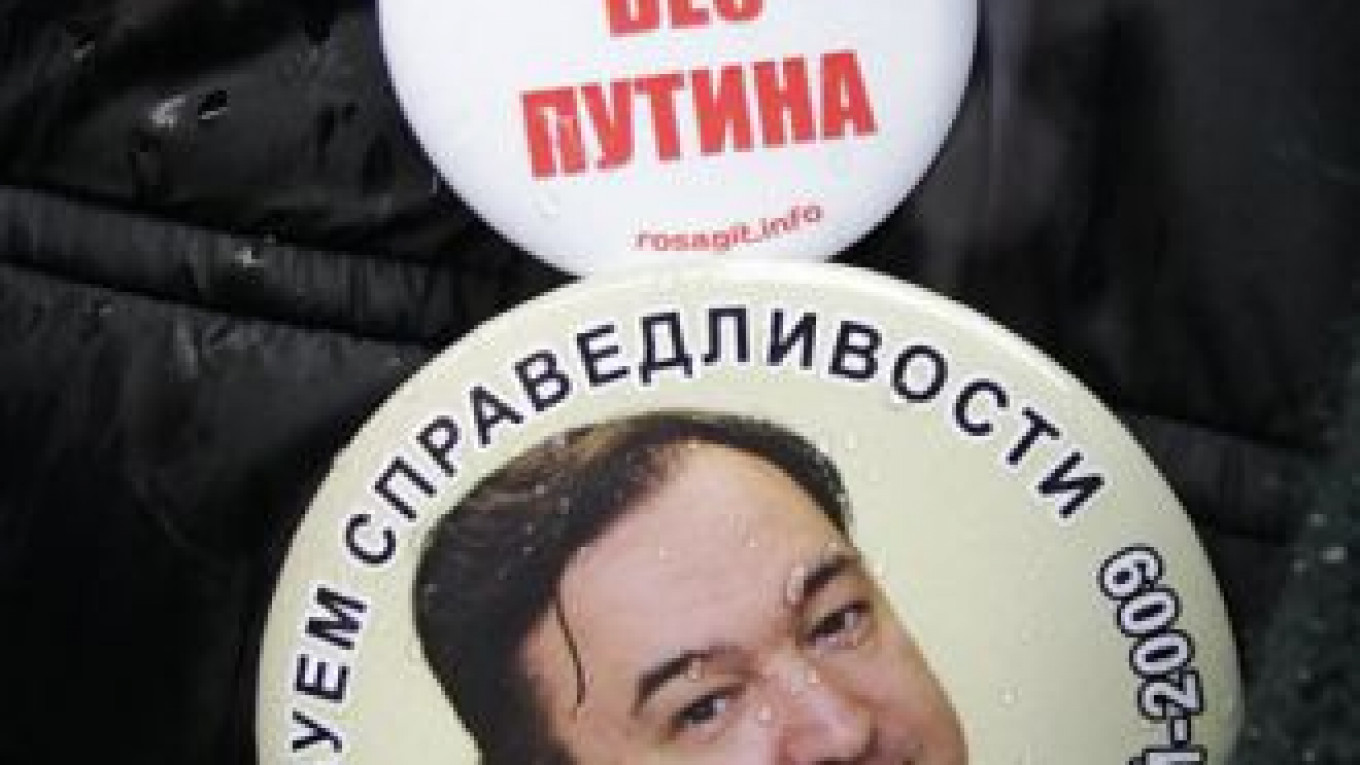WASHINGTON — Proposed U.S. legislation to punish Russian officials involved in human rights abuses could have "a significant negative impact" on U.S.-Russian relations, Moscow's envoy to the United States warned.
Russian Ambassador Sergei Kislyak said Monday that the U.S. Congress should not tie the so-called Sergei Magnitsky bill to an expected vote this year on establishing "permanent normal trade relations" between the two countries.
"If that is taken to an extreme, it'll be a significant negative impact on Russian-Americans relations," Kislyak said at a luncheon to tout Russia's hopes for closer trade ties with the United States.
"I cannot predict how we would react, but I'm certain it would undermine our ability to work together on a number of issues," Kislyak said.
The 2009 death of 37-year-old Magnitsky, who worked for equity fund Hermitage Capital and died after a year in Russian jails, spooked investors and tarnished Russia's image.
Before his arrest, Magnitsky had testified against Russian Interior Ministry officials during a tax evasion case against Hermitage. The Kremlin human rights council says he was probably beaten to death.
The case has heightened concerns in Congress about human rights conditions in Russia and made it even harder for the White House to persuade lawmakers to lift the Cold War-era Jackson-Vanik trade provision amendment.
However, if Congress refuses to remove the provision and establish permanent normal trade relations, Russia could legally deny U.S. companies the market-opening benefits of Moscow's accession into the World Trade Organization, which is expected by late July or August.
A number of lawmakers in both houses of Congress want the repeal of the Jackson-Vanik provision to include language that punishes human rights abusers in Russia, such as those who may be responsible for Magnitsky's death.
They have been pushing for legislation that includes asset freezes and visa bans on human rights violators in Russia.
Kislyak said the proposed bill was an unreasonable and unacceptable intrusion into Russian sovereignty.
"There is no country in the world that is perfect," he said, noting that Moscow had concerns about what he described as the U.S. court system's failure to investigate some cases of abuse or even the death of Russian children adopted by U.S. parents.
The countries should keep such issues separate, he said.
"As far as we are concerned, the Magnitsky case has nothing to do with trade," Kislyak said. "For us, the proposition to bring the Magnitsky case, it's almost an attempt to replace an anti-Soviet Jackson-Vanik [law] by an anti-Russian Magnitsky law."
Passing a clean bill would benefit both countries, Kislyak argued. While U.S.-Russia trade has grown to about $42 billion annually over the past decade, that is only about one-tenth of the trade between the Russia and the European Union, he said.
A new U.S. Senate draft of the Magnitsky bill, which already has the bipartisan support of more than 30 senators, would extend the penalties to human rights violators "anywhere in the world" to avoid specifically targeting Russia.
A Senate aide said it may not come up for a vote in the Senate Foreign Relations Committee until late May, after Russia's incoming president, Vladimir Putin, visits Washington.
Senate Finance Committee Chairman Max Baucus is pushing for a vote on permanent normal trade relations before Russia enters the WTO, but some observers believe action on the controversial issue could be delayed until after the Nov. 6 U.S. elections.
If that happens, Russia will cut tariffs on goods from other WTO members but not from the United States since Washington would not be in compliance with its obligations, Kislyak said.
A Message from The Moscow Times:
Dear readers,
We are facing unprecedented challenges. Russia's Prosecutor General's Office has designated The Moscow Times as an "undesirable" organization, criminalizing our work and putting our staff at risk of prosecution. This follows our earlier unjust labeling as a "foreign agent."
These actions are direct attempts to silence independent journalism in Russia. The authorities claim our work "discredits the decisions of the Russian leadership." We see things differently: we strive to provide accurate, unbiased reporting on Russia.
We, the journalists of The Moscow Times, refuse to be silenced. But to continue our work, we need your help.
Your support, no matter how small, makes a world of difference. If you can, please support us monthly starting from just $2. It's quick to set up, and every contribution makes a significant impact.
By supporting The Moscow Times, you're defending open, independent journalism in the face of repression. Thank you for standing with us.
Remind me later.






